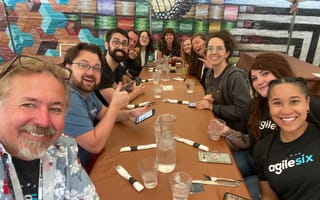Everyone has those days when they wake up for work in the morning and say, “Nope.”
Self-Management Coach Sara Quagliaroli calls days like these “Nope Days,” and she considers them harmful not only to those experiencing them, but those around them.
“It’s not healthy for us or our teams if we come to work cranky,” she said.
At Agile Six, a company that creates human-centered digital solutions for federal agencies, Quagliaroli and her colleagues are encouraged to take self-managed wellness time when needed to prioritize their emotional well-being. This perk is simply one of many that characterizes the company’s mission-driven culture.
According to Quagliaroli, Agile Six’s work environment centers around an ideal known internally as the company’s “just cause” — “We build better by putting people first.”
“To us, that means that our wholeness really matters,” she explained. “If we can’t be ourselves, we can’t do our best work for the people we serve.”
“Our wholeness really matters. If we can’t be ourselves, we can’t do our best work for the people we serve.”
With a focus on collaboration, Quagliaroli and her peers are empowered to support each other as they find the best solutions for their clients while taking the time they need to prioritize their personal needs.
“The ultimate goal is for each of us to feel whole and have energy at the end of the day to bring back to our families and communities,” she said.
Whether they’re sharing tips about home DIY projects over Slack or discovering career growth opportunities, team members across Agile Six honor the company’s purpose in everything they do. Below, Quagliaroli describes the many factors that make the company’s culture mission-driven, including the benefits on offer for employees and the ways in which they connect.

Agile Six is made up of cross-functional agile software development teams that partner with federal agencies to improve digital experiences for people who interact with government services. After the decision was made two years ago to step back from a traditional hierarchy, it took awhile for the company to decide what an alternative support structure would look like.
In addition to my role as a self-management coach, each agile team has a designated team coach who provides advice, not direction. Team coaches offer proactive and reactive support with the goal of helping nurture team health; build an inclusive, caring and trust-based environment; and connect the team with other company resources as needed. Each coach also has a practice area speciality and can provide support across the company in various areas, including the practice of agile, solutions, delivery, engineering and user experience.
What perks and policies support Agile Six’s culture?
We’re proud of our pay equity program. We have skill-based salary bands for each practice area that we publish in our job posts. We don’t negotiate salaries in order to maintain the integrity of this program. Our board has also set a salary cap to ensure that the highest executive salary isn’t more than five times larger than the target minimum salary.
We also offer self-managed wellness time for employees, which enables us to tend to personal needs and our families’ well-being. We can use this time for doctor’s appointments, caring for family members and supporting our emotional well-being. Additionally, we have an employee stock ownership program that’s designed to recognize the psychological ownership our team members claim by participating in our self-managed organization. This benefit, in addition to 401(k) matching, helps us build resources for our retirement. We all benefit from the program equally, regardless of title and salary. Besides that, employees can access financial support for home utilities or partial reimbursement for a coworking membership. Having the option to work out of the house a couple of days a week has been so supportive for my energy and mental health.
“We’re proud of our pay equity program. We have skill-based salary bands for each practice area … [and] we all benefit from our employee stock ownership program equally, regardless of title and salary.”
How do team members cultivate culture?
We’re serious about building our remote team culture. We foster strong, values-based teams and partner with like-minded companies to best support our clients. At the start of each project, a coach brings the team together to review our core values as well as the strategies and resources put in place to support those values. We use that foundation to jumpstart conversations on how to work together, support each other, make decisions and best utilize our strengths as both individuals and a team to meet our goals.
We also have lots of opportunities for employees, or “Sixers,” to build meaningful connections with their colleagues both on their respective teams and across the company. We have a Slack integration that pairs Sixers up for coffee chats every other week. Sixers are always starting new Slack channels to congregate based on areas of interest, including tabletop role-playing games, home DIY projects and sports. Our most active channel is “Families of All Kinds,” where employees share stories and photos from adventures far away and close to home.
Additionally, we take the opportunity to gather in person to work or play. We have occasional opportunities to work onsite, and Sixers are always initiating gatherings to connect with colleagues who live near them. We’re working on continuing to build opportunities for us to be present with each other, whether we live near or far from our peers.
CHOOSING IMPACTFUL OUTCOMES
According to Quagliaroli, one of Agile Six’s core values, “purpose,” is reflected in everything employees do, including the work they choose to accomplish. “We seek to find opportunities where the outcomes will positively, tangibly impact people, and where employees and prospective team members will be intrinsically motivated to support,” she said. Quagliaroli added that the company seeks out work that gives teams a sense of agency to decide how they wish to approach it.
What opportunities do team members have to grow professionally?
It’s common for someone’s responsibilities at Agile Six to shift organically over time, so much so that we call this out in our job descriptions. We don’t have traditional career ladders. We do hire folks with varying levels of professional experience, considering how we staff teams is informed by the needs of individual government contracts. As Sixers grow within their role, they have the option to apply internally for other roles that have different responsibilities and the potential for higher pay and increased growth.
What impact does working at Agile Six have on someone’s career?
If you become a Sixer, we commit to putting you first. As there aren’t extrinsic rewards built into our system, there’s more collaboration and less competition. Sixers often offer their expertise across teams to support their peers in solving complex problems. As a result, we have greater capacity to care for ourselves and our families. There’s no expectation that we’re working or communicating after hours or on the weekends.
“As there aren’t extrinsic rewards built into our system, there’s more collaboration and less competition.”
We have a skills-based pay structure to support equal pay for equal work. We’re in the process of exploring more tools, including nonviolent communication, to bolster our ability to identify emotions, share needs and collaborate to navigate interpersonal challenges with care and empathy.





